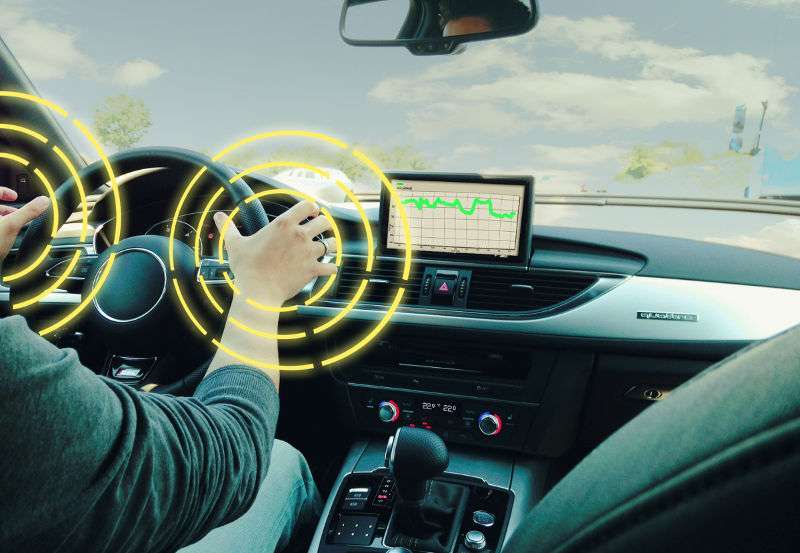July 15, 2015 weblog
Pressure-aware tech aims for wake-up safety via steering wheel

Any driver operating a steering wheel all alone who has gone into a "microsleep" and survived to tell the story knows how frightening that can be.
According to a news release from Hoffmann + Krippner on AB Newswire, "Traffic experts claim that about 25 percent of all accidents are caused by extreme fatigue while driving. This makes nodding-off, also referred to as 'micro-sleep,' in combination with heart attacks, as the leading cause of accidents, exceeding the number of accidents caused by alcohol and drugs."
The challenge for technologists is to come up with a system that can safely act faster than the victim's microsleep state or, if a victim has a medical condition that incapacitates the person, can support a safe-stop outcome.
News of a thin strip of sensors inserted beneath the wheel's covering is attracting interest as a way to smarten the steering wheel to recognize drowsy or incapacitated drivers. A steering wheel add-on to this effect has been developed by Hoffmann + Krippner, an engineering firm based in Germany, along with Guttersberg Consulting.
This technology can measure sensitivity in addition to position. The technology is called SensoFoil, thin-film membrane potentiometers that act as reliable membrane position sensors.
The operator during normal driving constantly moves hands on the wheel, changing pressure as fingers grip the wheel. Using SensoFoil inside the steering wheel, the vehicle can sense if the operator has fallen asleep with hands on the wheel or if hands are no longer on the wheel. This can trigger the safety protocol, either to wake up the driver or implement corrective measures.
Ben Coxworth in Gizmag noted how the technology can track deviations from driving patterns: "When pressure is applied and causes the layers to touch one another, it creates a short circuit between those layers, much in the same way that a resistive touchscreen works. A microprocessor keeps track of the intensity, frequency and location of those shorts, and uses it to establish a typical driving pattern for the user. When they deviate from it significantly, the car will then alert them to wake up and pull over."
Once alerted by the Smart Steering Wheel, the car can try to wake the driver or take over control and steer the vehicle to a safe stop along the road. In case of a medical emergency, the car could even drive itself to the closest medical emergency center while sending out an alert to the appropriate authorities, said the company.
Jens Kautzor, CEO of Hoffmann + Krippner, said the sensing technology needs little external energy since power consumption is low.
Fundamentally, this is a wheel that can tell the driver to get a grip (the car can be programmed to send an alert or to buzz the driver to WAKE UP! said the news release on AB Newswire) or in a medical emergency the car may take charge to protect the driver.
Coxworth in Gizmag explained the pressure factor: "The technology is based on the fact that when people drive and are reasonably alert, they're constantly applying pressure to the wheel and/or moving their hands along it. If someone should fall asleep, have a heart attack or otherwise lose consciousness, that pressure will lessen and their hands will move less."
The technology has not yet reached the marketplace. Claudia Bacco, writing in RCR Wireless News, commented that this is "Interesting technology that could save many lives and it will be interesting to see this come to market."
© 2015 Tech Xplore





















